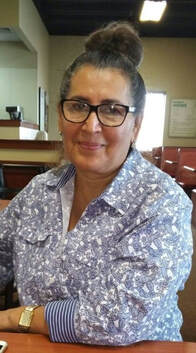 Olga Aguirre, participant in CDC’s National DPP lifestyle change program Olga Aguirre, participant in CDC’s National DPP lifestyle change program A National Diabetes Month Story Olga Aguirre has been in good health for most of her life. Because of her family’s history with diabetes, her doctor recommended that she join CDC’s National Diabetes Prevention Program (National DPP) lifestyle change program. Participating in the program gave Olga not only the tools to take care of her health, but also a sense of belonging. “I was a sales manager at a store and was used to talking to people all the time. Then my husband fell ill, and I stopped working to take care of him. This caused me some anxiety and affected my eating habits,” says Olga. “Being able to join a group like this has been very nice. These are people I can relate to – the coaches and participants are very respectful of other opinions. In this type of class, you learn from each other, and that makes it interesting.” Participating in the program helped Olga prevent type 2 diabetes, which runs in her family. Olga’s grandmother had severe complications from diabetes, and as a result lost both her feet. This made a big impact in Olga’s life. “I was very close to my grandmother, and I always saw her struggle to take care of her health,” Olga says. “This program taught me how to read food labels and count calories. I also learned about the importance of physical activity. I try to walk at least 30 minutes every day. I also sweep my porch and help my husband pick up leaves. I always have the radio on, and I dance while I do house chores. Colombian music gets me going.” Even after finishing the program, Olga has kept in touch with her lifestyle coaches. She says she sometimes sends them photos of the dishes she has prepared and the way she sets her dinner table. “I show them photos of my coconut water and nopales (prickly pear). I also send photos to my daughters-in-law to teach them how to prepare healthy dishes for their families,” she says. Olga’s breakfast might be an oatmeal shake with bananas, strawberries, almonds, or blueberries. For lunch, she frequently cooks an omelet with green peppers, mushrooms, cheese, and sometimes ham. For dinner, Olga and her husband have chicken or fish. In fact, they love fish! “Sometimes in the afternoon if we are hungry, we have sardines, a boiled egg, or a veggie like a baked potato or a chayote (squash). Other times we have salads and I add olive oil,” she says. To succeed in the program, Olga encourages participants to trust themselves and follow the program’s directions. “You must have willpower to take your medicines and stay healthy. Also try to avoid stress, as it does have a big impact on your health.” This November for National Diabetes Month, Olga has something she wants everyone at risk for type 2 diabetes to know: “If you join the lifestyle change program, make sure you stick to the plan and follow what you learn in class and your doctor’s instructions. It is important to follow the booklets. Each chapter is a lesson.” You can be like Olga and reduce your risk for developing type 2 diabetes. Learn more about the CDC’s National Diabetes Prevention Program here.
0 Comments
Your comment will be posted after it is approved.
Leave a Reply. |
The National Center for Farmworker HealthImproving health care access for one of America's most vulnerable populations Archives
March 2024
Categories
All
|

 RSS Feed
RSS Feed